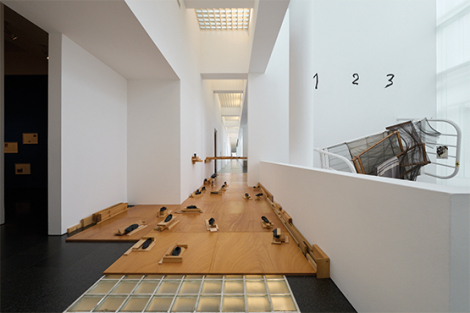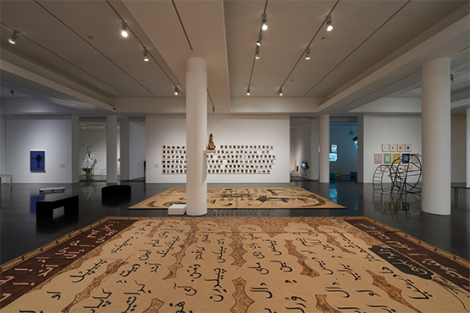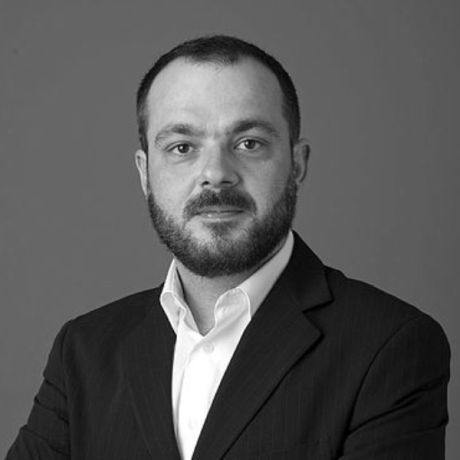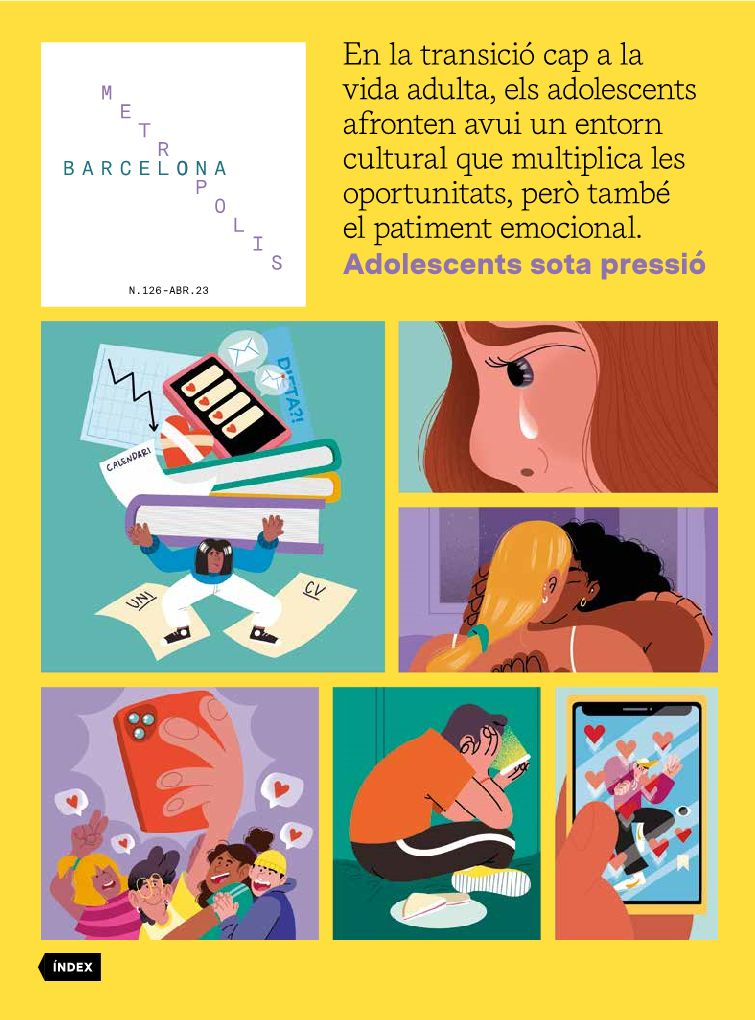MACBA gets up to date
- Culture Folder
- Exhibitions
- Apr 23
- 5 mins
Elvira Dyangani Ose opened her first exhibition in the MACBA collection in December 2022. After chronological exhibitions and other shows with a socio-political theme, the aim was to highlight, as the title itself suggests, the Poetic Intention of the works.
Do children have a political voice? Do we adults know what their demands are? Do politicians take them into account in their programmes? Colombian artist Iván Argote (Bogotá, 1983) has extensive experience in working with children: he himself is the son of two of the founders of the Cambio Social party and, later, of the Colombian Social Democratic Party, and since 2011 he has been running a protest workshop for children aged four to eight. So far, he has run the workshop over twenty times in more than a dozen cities in Europe, Africa, Latin America and the United States. The images and documents from the workshop he held in a French museum, brought together in an installation entitled Activissimme!!!, 2011-2013, are among the pieces featured in the new exhibition of MACBA’s permanent collection, entitled Poetic Intention. It is curated by the museum’s director, Elvira Dyangani Ose; the curator of the collection, Antònia Maria Perelló; and the curators Claudia Segura and Patricia Sorroche.
There are many more, including Updated, the installation by Pep Duran (Vilanova i la Geltrú, 1955) that seeks to break with inertia, because it blocks the visitor’s path and forces them to decide whether to step on the work or look for an alternative route to enter the rooms, and the well-known Ayuda humanitaria [Humanitarian Aid] by Núria Güell (Vidreres, Girona, 1981). The latter is a piece that was born out of her marriage to the Cuban who had written her the most beautiful love letter, so that he could acquire Spanish nationality. At MACBA, this work can be seen in the previously unseen format of a large installation that reproduces the dining room of a house. And Helicon, the video by Fito Conesa (Cartagena, 1980) in which seven musicians invoke the end of the world in an artificial lake created from the remains of mining activity in La Unión.
Colonialism and identity issues are represented in photographs by Daniela Ortiz that deal with the slave-owning past of figures such as Antonio López and Joan Güell
Núria Güell and Fito Conesa are two of the artists making their debut in an exhibition of the MACBA collection. Also making their debut are Bernat Daviu (Fonteta, Girona, 1985), with videos of dancers among paintings of tarasques, as Gerhard Richter and Sean Scully, Regina Giménez, Mirtha Dermisache, Kristina Kostadinova, Ángela de la Cruz, Ângela Ferreira, Magdalena Jitrik, Amalia Pica and Sandra Gamarra. Also featured are Zoe Leonard (New York, 1961) with a poem calling for a lesbian president for the United States, as well as Mar Arza, Concha Jerez and Elena del Rivero. New artworks can be seen by other artists who were previously part of the collection, such as Iván Argote himself, Dora García, Laia Estruch, The Otolith Group, Tres, Jorge Ribalta and Ignasi Aballí (Barcelona, 1958). The latter (Barcelona, 1958) takes centre stage, together with Regina Giménez (Barcelona, 1966), in another of the highlights of the exhibition: the installation Vitrines CMYK, where his minimalist hues engage in dialogue through colour with her cosmic canvases.
 Pep Duran's creation blocks the visitor's path and forces them to decide whether to step on the work or look for an alternative route. ©Miquel Coll/MACBA
Pep Duran's creation blocks the visitor's path and forces them to decide whether to step on the work or look for an alternative route. ©Miquel Coll/MACBAThe focal point of another of these dialogues is colonialism and issues of identity, and it features photographs by Daniela Ortiz (Cusco, Peru, 1985) in which she explores the slave trade past of figures such as Antonio López and Joan Güell, and the interactive rug by Tere Recarens (Arbúcies, Girona, 1967), reminiscent of a legendary Sasanian rug. Associations such as this are the outcome of the fresh and innovative approach that Dyangani has brought to the collection after five years of chronological exhibitions and having considered how to break away from curatorial and museographic discourses that ultimately wind up “being reduced to a sort of aphasia”.
Eager to break new ground
Can a museum place the works and their ways of experiencing the world at the centre of everything, Dyangani Ose wonders, following the Martinican poet and philosopher Édouard Glissant. In parallel to the works exhibited, the eagerness of Dyangani and her curatorial partners to break new ground is also evident in how the space is approached. Like with Pep Duran’s piece, the curators rebel against the limitations and symbolic importance of Richard Meier’s building, for all that it stands for as an iconic building and as a reinterpretation of the architecture of the modern movement and of Le Corbusier. Corner Piece by Richard Artschwager (Washington D.C., 1923 – Albany, New York, 2013) is displayed in an unexpected spot and, above all, the show includes a piece by Luz Broto (Barcelona, 1982), consisting of the creation of a new wall that will grow and that will end up enclosing the exhibition space.
The museum has more than fulfilled its pending task of welcoming younger Catalan artists.
With regard to the collection’s new exhibition, it can be concluded that the MACBA has gotten itself up to date: instead of the usual prominence accorded to the artistic practices of the 1960s and 70s in the museum’s history and discourses, now a large number of the 127 works and 88 artist’s books – a reflection of the work of the Centre for Studies and Documentation – by almost one hundred artists are from the last twenty years. The museum has also more than fulfilled its pending task of welcoming younger Catalan artists.
 The interactive rug, the work of Tere Recarens, is reminiscent of a legendary Sasanian rug. ©Miquel Coll/MACBA
The interactive rug, the work of Tere Recarens, is reminiscent of a legendary Sasanian rug. ©Miquel Coll/MACBADyangani and her team have done tremendous work in the institutional arena because they have successfully placed value on the acquisitions that Barcelona City Council and the Government of Catalonia have made for the museum in recent years, as well as the purchases made by the MACBA Foundation, with budgets that are often beyond the scope of Catalonia’s government funds. The exhibition format is also unprecedented in this museum, because it will change every six months until the exhibition comes to an end in mid-2024. During these two transformations, the number of pieces from the 1980s, which on this occasion are in the minority, will increase.
MACBA Collection.
Prelude. Poetic Intention
MACBA. Until mid-2024
Exhibition curated by Elvira Dyangani Ose, Antònia Maria Perelló, Claudia Segura and Patricia Sorroche.
Guided tours every Saturday at 6 pm, by Avalancha, an artistic and educational research collective.
The newsletter
Subscribe to our newsletter to keep up to date with Barcelona Metròpolis' new developments




